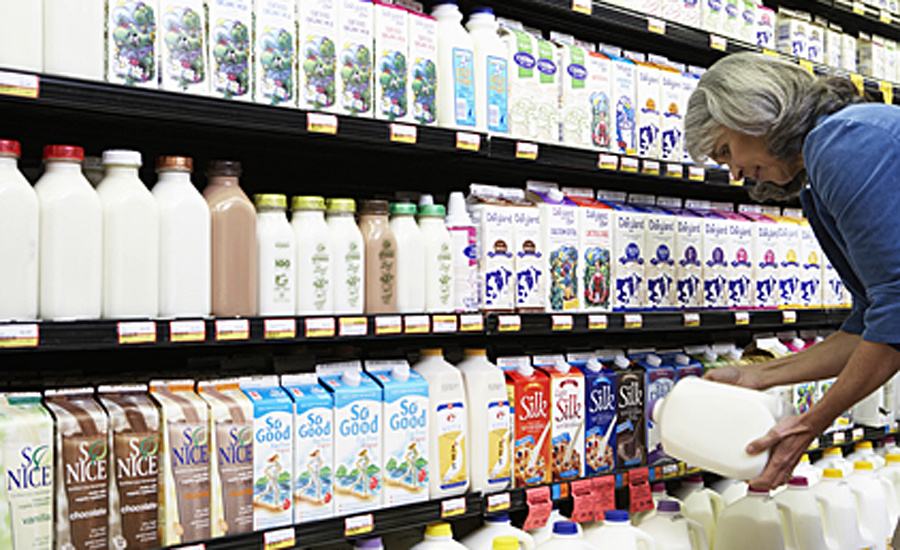Study reveals more Americans embracing plant-based, organic, non-GMO foods
Dairy alternatives ranked as the favorite "better-for-you" food, according to the study.

More grocery shoppers are seeking out and trying "better-for-you" foods, especially dairy- and meat-free alternatives, according to a new national health food study by Earth Balance, Boulder, Colo. The study polled 2,000 consumers to determine which new foods they are trying, what is their top motivators and trends in healthy eating.
While the better-for-you food trend is not new, its growth does not seem to be slowing down anytime soon. In fact, when asked which factors are most important to them when shopping for food, respondents said buying local (37%), organic (33%) and non-GMO (30%) are key. Additionally, Americans are more willing to try better-for-you-foods, with the study showing the most-tried are healthy snacks, dairy alternatives and oil alternatives.
Dairy-free reigns supreme among better-for-you foods
Dairy alternatives ranked as the favorite better-for-you food, cited by 29% of respondents. Superfoods (e.g., chia, acai and quinoa), alternative snacks (e.g., gluten-free crackers, nut butters and Greek yogurt) and alternative oils (e.g., avocado, coconut and sunflower) tied for second with 28%. Plant-based proteins, such as hemp hearts, lentils and spirulina, ranked third with 18%.
Of all the popular better-for-you foods, participants said the ones they consume most often are green tea (33%), dairy alternatives (31%), kale (21%) and quinoa (16%). On the flip side, the ones they consume least often are farro (2%), maca powder (3%), wheat berries (3%) and nutritional yeast (3%).
Plant-based eating is trending
Whole Foods Market, Austin, Texas, cited "plant-based everything" as a top 2016 trend to watch, and Earth Balance's study bears out this prediction, showing consumers are more accepting of this newer food movement. In fact, 42% of consumers said they know more about plant-based diets now compared to five years ago, and 43% are more likely to try plant-based alternatives today. Thirteen percent also report trying a vegetarian lifestyle.
What's more, over half said they've tried dairy-free alternatives such as dairy-free milk, cheese and yogurt. Sixty-three percent have tried plant-based protein alternatives, with tofu, meatless burgers and meatless hot dogs topping the list.
More than one-third (36%) of survey respondents admitted that they have avoided ordering or asking for a certain food because they were unsure how to pronounce it. Foods that produced the most tongue-tying effect were seitan (38%), acai (35%), jicama (33%), kombucha (33%) and spirulina (33%).
And, 64% of consumers cited price as the main reason they hold back from trying a new type of health food, followed by concerns about not liking its taste or texture and lack of store availability, which ranked third. That said, approximately one-third are willing to pay an additional $2 or more for a better-for-you alternative to a traditional food item.
Mother knows best
When it comes to what entices people to give a new health food or trend a try, the majority of respondents said recommendations from friends and family. Despite many brands enlisting celebrities and athletes to endorse products and campaigns, the study found they hold little clout. Less than 3% of participants report trying a new food or dietary lifestyle because of a celebrity endorsement, compared to 43% who are influenced to try new products based on recommendations from family or friends.
Ode to snacking
While Americans are more open than ever to try better-for-you foods, they still love to snack. When asked which snacks they find most tempting, respondents ranked chocolate in the top spot (31%), followed by potato chips (16%) and ice cream (14%), proving that they still crave a little balance. The study found that 88% of respondents eat a snack that they know is not healthy at least once per day.
Survey methodology
This survey was conducted online by 72 Point Inc., New York, on behalf of Earth Balance in June 2016 among 2,000 U.S. consumers ages 18 and older.
Looking for a reprint of this article?
From high-res PDFs to custom plaques, order your copy today!






